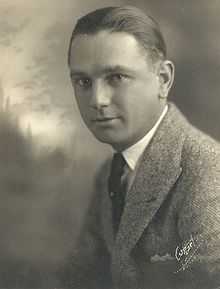Gussie Mueller
| Gussie Mueller | |
|---|---|
 Gussie Mueller, c. 1922 | |
| Background information | |
| Birth name | Gustave Mueller |
| Also known as |
"Gus" or "Gussie" |
| Born |
April 17, 1890 New Orleans, Louisiana, U.S. |
| Origin |
|
| Died |
December 16, 1965 (aged 75) Hollywood, California, U.S |
| Genres | Dixieland |
| Instruments | Clarinet |
| Years active | c. 1910-c.1940 |
Gustave "Gussie" Mueller (April 17, 1890 – December 16, 1965) was an early jazz clarinetist.
The New Orleans, Louisiana-born Mueller was a top clarinetist with Papa Jack Laine's bands in New Orleans before going to Chicago, Illinois with Tom Brown's band in early 1915. After serving in the Army in World War I he moved to California and joined the early Paul Whiteman Orchestra, with which he moved to New York City. He helped give Whiteman an idea of the Dixieland jazz style.One of the Whiteman Orchestra's early hit records, as well as one of the unfortunately few recordings where Mueller can be heard prominently, is The Wang Wang Blues which Mueller dominates in a style similar to Larry Shields. While Mueller shares composer credit on "Wang Wang", some of his New Orleans contemporaries said the number was all his and he had featured it before joining Whiteman.
As Paul Whiteman's band grew in popularity, and he started using arrangements with little room for improvisation, Mueller left the band in November 1920, saying "You call yourselves a jazz band, but you can't play the blues worth a damn". Mueller returned to California to join his old friend Ray Lopez in the Abe Lyman Orchestra. Mueller stayed in the Los Angeles area, playing with dance bands, novelty and "Hillbilly" bands, and working on motion picture soundtracks before retiring after World War II.
| ||||||||||||||||||